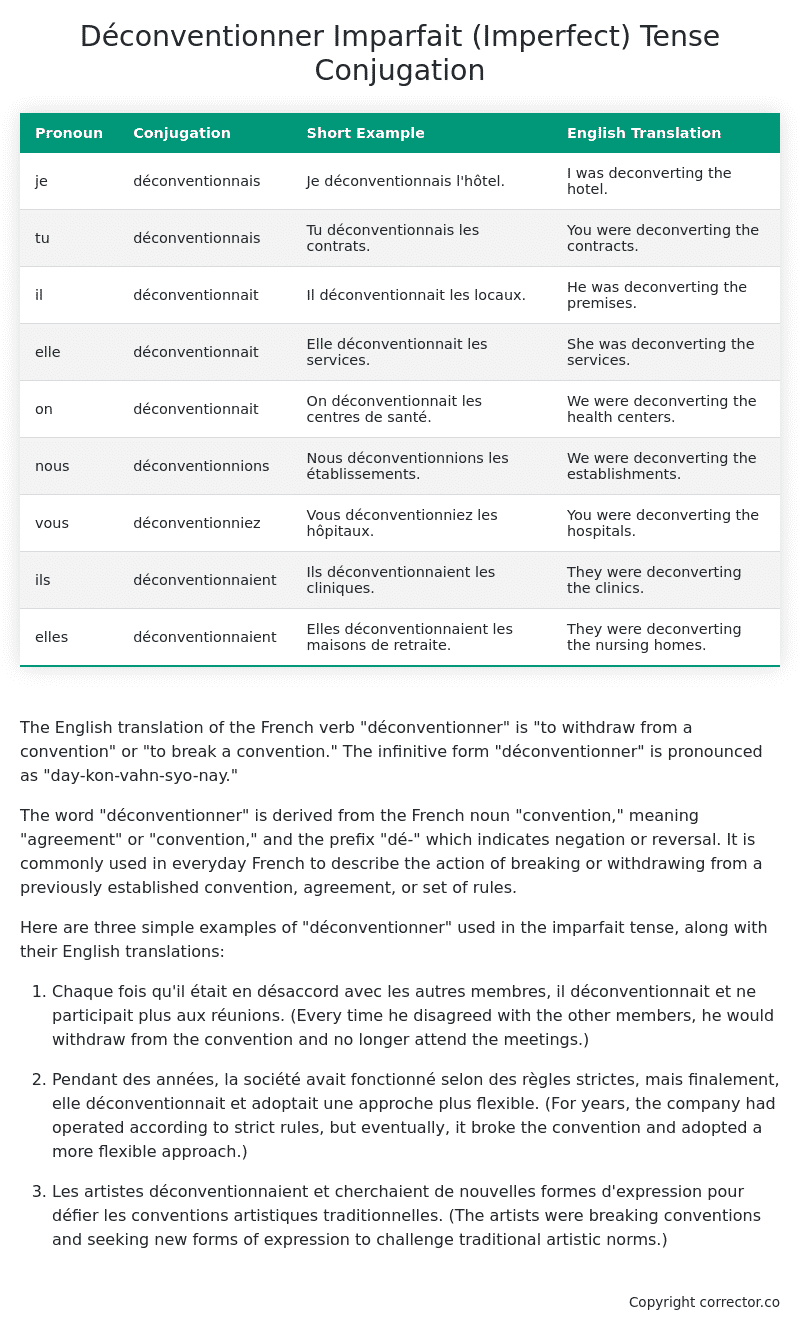Imparfait (Imperfect) Tense Conjugation of the French Verb déconventionner
Introduction to the verb déconventionner
The English translation of the French verb “déconventionner” is “to withdraw from a convention” or “to break a convention.” The infinitive form “déconventionner” is pronounced as “day-kon-vahn-syo-nay.”
The word “déconventionner” is derived from the French noun “convention,” meaning “agreement” or “convention,” and the prefix “dé-” which indicates negation or reversal. It is commonly used in everyday French to describe the action of breaking or withdrawing from a previously established convention, agreement, or set of rules.
Here are three simple examples of “déconventionner” used in the imparfait tense, along with their English translations:
-
Chaque fois qu’il était en désaccord avec les autres membres, il déconventionnait et ne participait plus aux réunions.
(Every time he disagreed with the other members, he would withdraw from the convention and no longer attend the meetings.) -
Pendant des années, la société avait fonctionné selon des règles strictes, mais finalement, elle déconventionnait et adoptait une approche plus flexible.
(For years, the company had operated according to strict rules, but eventually, it broke the convention and adopted a more flexible approach.) -
Les artistes déconventionnaient et cherchaient de nouvelles formes d’expression pour défier les conventions artistiques traditionnelles.
(The artists were breaking conventions and seeking new forms of expression to challenge traditional artistic norms.)
Table of the Imparfait (Imperfect) Tense Conjugation of déconventionner
| Pronoun | Conjugation | Short Example | English Translation |
|---|---|---|---|
| je | déconventionnais | Je déconventionnais l’hôtel. | I was deconverting the hotel. |
| tu | déconventionnais | Tu déconventionnais les contrats. | You were deconverting the contracts. |
| il | déconventionnait | Il déconventionnait les locaux. | He was deconverting the premises. |
| elle | déconventionnait | Elle déconventionnait les services. | She was deconverting the services. |
| on | déconventionnait | On déconventionnait les centres de santé. | We were deconverting the health centers. |
| nous | déconventionnions | Nous déconventionnions les établissements. | We were deconverting the establishments. |
| vous | déconventionniez | Vous déconventionniez les hôpitaux. | You were deconverting the hospitals. |
| ils | déconventionnaient | Ils déconventionnaient les cliniques. | They were deconverting the clinics. |
| elles | déconventionnaient | Elles déconventionnaient les maisons de retraite. | They were deconverting the nursing homes. |
Other Conjugations for Déconventionner.
Le Present (Present Tense) Conjugation of the French Verb déconventionner
Imparfait (Imperfect) Tense Conjugation of the French Verb déconventionner (You’re reading it right now!)
Passé Simple (Simple Past) Tense Conjugation of the French Verb déconventionner
Passé Composé (Present Perfect) Tense Conjugation of the French Verb déconventionner
Futur Simple (Simple Future) Tense Conjugation of the French Verb déconventionner
Futur Proche (Near Future) Tense Conjugation of the French Verb déconventionner
Plus-que-parfait (Pluperfect) Tense Conjugation of the French Verb déconventionner
Passé Antérieur (Past Anterior) Tense Conjugation of the French Verb déconventionner
Futur Antérieur (Future Anterior) Tense Conjugation of the French Verb déconventionner
Subjonctif Présent (Subjunctive Present) Tense Conjugation of the French Verb déconventionner
Subjonctif Passé (Subjunctive Past) Tense Conjugation of the French Verb déconventionner
Subjonctif Imparfait (Subjunctive Imperfect) Tense Conjugation of the French Verb déconventionner
Conditionnel Présent (Conditional Present) Tense Conjugation of the French Verb déconventionner
Conditionnel Passé (Conditional Past) Tense Conjugation of the French Verb déconventionner
Conditionnel Passé II (Conditional Past II) Tense Conjugation of the French Verb déconventionner
L’impératif Présent (Imperative Present) Tense Conjugation of the French Verb déconventionner
L’impératif Passé (Imperative Past) Tense Conjugation of the French Verb déconventionner
L’infinitif Présent (Infinitive Present) Tense Conjugation of the French Verb déconventionner
L’infinitif Passé (Infinitive Past) Tense Conjugation of the French Verb déconventionner
Le Participe Présent (Present Participle) Tense Conjugation of the French Verb déconventionner
Le Participe Passé (Past Participle) Tense Conjugation of the French Verb déconventionner
Struggling with French verbs or the language in general? Why not use our free French Grammar Checker – no registration required!
Get a FREE Download Study Sheet of this Conjugation 🔥
Simply right click the image below, click “save image” and get your free reference for the déconventionner imparfait tense conjugation!

Déconventionner – About the French Imparfait Tense
NOTE: To take a deep dive into all the French tenses then see our article on Mastering French Tense Conjugation.
Formation of the Imparfait Tense
For regular -er verbs:
For regular -ir verbs
For regular -re verbs
Common Everyday Usage Patterns
Description of Past Habits
Background Information
Mental and Emotional States
It’s employed to express emotions, thoughts, or physical sensations in the past. For example: “J’étais content quand il est arrivé.” (I was happy when he arrived.)
Ongoing Actions
Points to Note About the Imparfait Tense
Passé Composé vs. Imparfait
Conditional
Si Clauses
Narration
I hope you enjoyed this article on the verb déconventionner. Still in a learning mood? Check out another TOTALLY random French verb imparfait conjugation!


